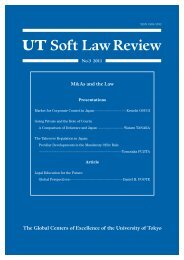UT Soft Law Review
UT Soft Law Review
UT Soft Law Review
You also want an ePaper? Increase the reach of your titles
YUMPU automatically turns print PDFs into web optimized ePapers that Google loves.
<strong>UT</strong> <strong>Soft</strong> <strong>Law</strong> <strong>Review</strong> No.2 2010that be the “threat” to justify the defense measure under the so-called Unocal standard,under the Delaware case law? Is it regarded as non-threat? It sounds a little too particular, butcould it influence how to treat the interests that should be protected for justifying the defensemeasures. Can you tell us if possible?Jacobs: Some all-cash-all-shares offers might well constitute a “threat” that is cognizableunder Unocal. Even where the offering price is at a premium over market price, there may bea question of whether that price is fair; that is, whether an investment banker would opinethat that price was fair in relation to the intrinsic value of the company. If a banker wouldconclude that the offer is under-priced, then that is a cognizable threat against which a boardcould defend and also use as a tool to negotiate a higher price.On the other hand, if the offering price is fair, there may be other reasons why such a bidcould constitute a threat against which the board could defend. For example, suppose thatthe offer is subject to obtaining financing, and is being made in the current economy wherefinancing is very difficult, if not impossible, to obtain. If there is a substantial risk that thefinancing will not be available and that the offer will not close, then no matter how high theoffering price may be, the board might reasonably regard the offer as a “threat.” The samewould be true if a transaction with the bidder would result in an antitrust violation or aviolation of some different provision of law.If you sweep all of this to one side and assume no obstacles, that is, no legal problem, nofairness problem, no closing problem, then the question becomes whether a target board canlegitimately say that an all-shares offer that is fair and that will be consummated constitutes a“threat” under Unocal. The answer could be yes, but under a very odd theory of Delaware lawthat was adopted by the Supreme Court before I joined it. That theory is called “substantivecoercion,” which is: where management has a business plan that it believes will generate valuethat is greater than the amount of the offer and has reason to believe that the shareholdersmight not understand their plan, this possibility of shareholder confusion might, in somecircumstances, validly constitute a threat.The case that creates the greatest doctrinal and theoretical issues is where the bid is a“perfect,” flawless bidˆ”hat is, a bid that clearly would exceed whatever value managementcould generate internally, will be financed, and will pose no antitrust or other legal obstacle.In those circumstances can the board defend against that type of bid? The only argumentthat the board would have would is what I call the ultimate, “Just Say No” scenario. That is,the board would argue that it intends to keep the defense in place, not because the boardneeds time to develop a better transaction, or to bring in a “white knight competing bidder,”and not because the board can generate more value internally. The only justification would bethat “the board is the board,” and in its wisdom believes that the best policy for thecorporation is to remain independent.No matter how fair the offer may be, the question under Delaware law is: Can a board “justsay no” in these circumstances? That question has thus far never been answered. The reason,I think, is that when offers get to a high enough level, such pressure is being exerted on the56





